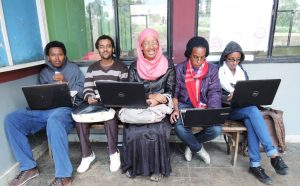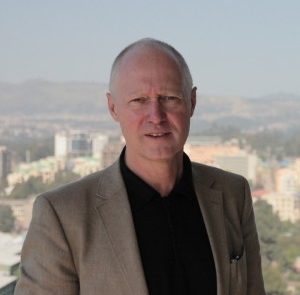HANS STOISSER
Europe supports authoritarian Chinese development model in Ethiopia
Recently I had a very interesting talk with my colleague Johannes Fiedler, architect and urban planner, who just came back from Ethiopia where he spent one year as a Visiting Professor at the University EiABC (Ethiopian Institute of Architecture, Building Construction and City Development). Read what he is saying about Ethiopia, the Chinese development model, and Europe’s role.
Students acquire knowledge and competence rapidly
Johannes, in the past year you worked as a visiting professor for Urban Design at the University of Addis Abeba in Ethiopia. How was your year in Addis? Is the professional life of a professor in Ethiopia very different from Europe? What about the daily work of students in Addis?

Johannes: Academic life is indeed quite different. Most students live on campus and the university is their central social experience. The undergraduate courses are two years longer, as many of the basic cultural skills which in Europe are being trained in secondary education have to be developed in the university. Most students are very motivated and they acquire knowledge and competence rapidly.
What about urban planning. Is it an important topic at the university? Are the teaching and the research relevant for the actual urban development of Addis Abeba, one of the fastest growing cities in Africa? Is the university itself involved in urban planning activities of the capital of Ethiopia?
Johannes: EiABC is a school dedicated to the design of the built environment. Practically all chairs are in some way involved with physical development. Unfortunately, the innovative and sometime critical positions developed at EiABC are not assumed by the authorities. Planning institutions and municipalities stick to old ideas of functionalist, top-down planning. As for my chair, we have been able to win a consultancy contract with the Ministry of Urban Development. I hope there will be some knowledge transfer in both directions.
You say that compared to Europe the government is autocratic and urban planning is done in a very hierarchical way. We know that China is heavily investing in Ethiopia. Is the style of governance also following the Chinese example?
The Chinese development model is visible everywhere
Johannes: The Chinese development model is visible everywhere. Not only in urban space, where Chinese contractors are building motorways and rail systems, but also in the way economy and civic life are organised. Business activity is tightly controlled and there is no free press. Government-backed development projects often result in uprooting local residents, farmers and businesses, as normal people have no property rights. The concept of “the citizen” is completely absent.
Your general resume about this year in Addis?
Johannes: I see that this country is sacrificing its own culture and distorting an entire generation of young and motivated people for the sake of a model of modernization which is not sustainable, neither in ecological, nor in societal terms.
Was it in your mind to extend your contract for another year?
Johannes: I was intending to go on for another year as I saw that the reform of lecture contents and chair organization started to bear fruits, but the Ministry of Education obviously saw this reform as a threat, not as a chance. In Ethiopia, it is the central government which decides about university positions. Universities have no autonomy. Deans and directors execute orders from above. I was very disappointed to see that this also applies to EiABC, which has a tradition of independence.
You say that the Ethiopian government didn’t extend your contract because in your lectures you criticized the Chinese development model of Addis? Was it the government who took that decision? Does the German financing institution defend the professional content and standards of the financed personnel?
Johannes: I was never told why the continuation of my contract was not endorsed by the Ministry. I heard that some chair staff had complained and others had given a very positive evaluation of my work. I can only assume that my critical position on government policies played a role. DAAD, the German organisation which is operating the program for visiting professors, retains a completely passive role. Whatever the Ministry of Education decides, they execute.
Has Europe given up to spread its ideas of pluralism and humanism?
Germany is paying all these visiting professors, does Germany not have any saying in in the selection process?

Johannes: DAAD is being paid by the Ethiopian government to supply international teaching and administrative staff, albeit from funds which are provided by external donors. Germany is also contributing a lot. Unfortunately, in this program there seem to be no academic procedural standards, no system of evaluation which is up to international practices. I think that DAAD is damaging its reputation by catering to an authoritarian system.
To sum up, European development aid finances visiting professors at local universities in African countries. But basic working conditions as freedom of research and teaching are no pre-conditions. On the contrary, European money might also finance the promotion of authoritarian thinking, in this case the Chinese development model. It seems that Europe has given up to spread its ideas of pluralism and humanism and leaves the realm of ideas to China and other authoritarian countries. – Thank you for the interview!



